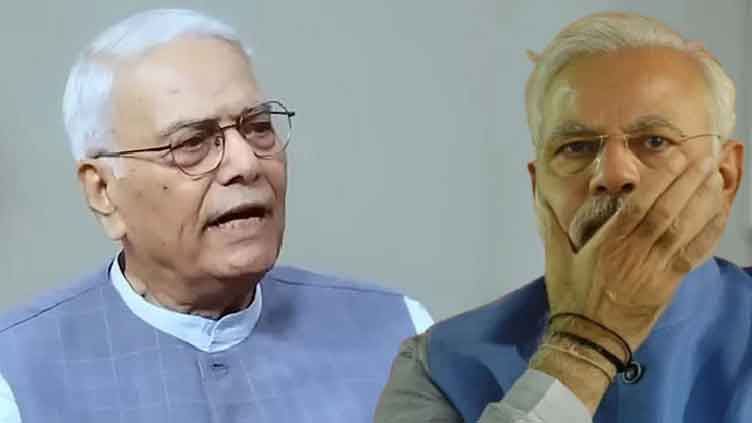DM Monitoring
NEW DELHI: Former Indian foreign minister Yashwant Sinha has exposed Prime Minister Narendra Modi’s alleged manipulative tactics, questioning the timing of attacks like those in Pulwama and Pahalgam coinciding with elections.
In an interview, Sinha said such incidents seem to conveniently occur right before elections, claiming the Pahalgam drama was orchestrated to win the Bihar elections. He pointed out that terrorism struck just before polls in Pulwama too, and Modi politically capitalized on it. The Uri attack led to the so-called “surgical strike,” which was also used as an election campaign tool.
Sinha criticised Modi for using national security for political gain, stating that Modi even asked for votes in the name of the Pulwama “martyrs” during rallies. He alleged that the Pahalgam attack was aimed at securing electoral victory in Bihar and that the Modi government seeks political mileage from terror incidents.
According to defence analysts, instead of engaging in post-ceasefire dialogue with Pakistan, the Modi administration is more focused on preparing for the Bihar elections. Modi’s flawed policies, they argue, have left India isolated in the region.
Earlier, Pakistan on Tuesday said that the hate-driven invocation of violence in the recent remarks of Indian Prime Minister Narendra Modi’s was deeply disturbing, urging the international community to take serious note of India’s escalating rhetoric, undermining regional stability and the prospects for lasting peace.
“Pakistan has taken note of the recent remarks by the Prime Minister of India, delivered in Gujarat with the theatrical flourish of a campaign rally rather than the sobriety expected of the leader of a nuclear-armed state. The hate-driven invocation of violence in his remarks is deeply disturbing, not only for its content but for the dangerous precedent it sets in a region already burdened by volatility. We regret the continued erosion of maturity and decorum in Indian statecraft,” Foreign Office spokesperson Shafqat Ali Khan said in a statement.
He said that such statements blatantly violated the fundamental principles of the United Nations Charter, which obliged member states to resolve disputes peacefully and to refrain from the threat or use of force against the sovereignty or political independence of other states.
“Pakistan views these remarks as a reckless provocation, intended to distract from the ongoing human rights abuses and demographic engineering in Indian Illegally Occupied Jammu & Kashmir.”
He said that Pakistan’s record as a leading contributor to UN peacekeeping and its consistent cooperation in global counter-terrorism efforts spoke louder than any hostile soundbite. If extremism is indeed a concern for the Indian government, it would do well to turn inward — toward the alarming rise of majoritarianism, religious intolerance, and the systematic disenfranchisement of minorities under the increasingly brutal Hindutva ideology, the spokesperson added.
He reiterated that Pakistan remained committed to peace based on mutual respect and sovereign equality. However, any threat to its security or territorial integrity will be met with firm and proportionate measures, in accordance with Article 51 of the UN Charter, he added.



